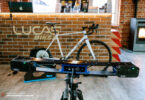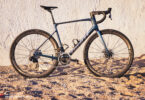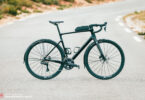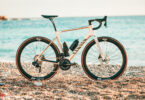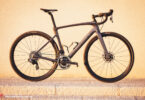In a concept comparison of mountain and gravel bikes, the Fustle Causeway TRAIL Lite combines both worlds. Are dropper post and geometry genes from the mountain bike sector the recipe for the most versatile bike ever? Here are the results of our test.
Get an overview of the grouptest here: Gravel vs. mountain bike – 6 models on test
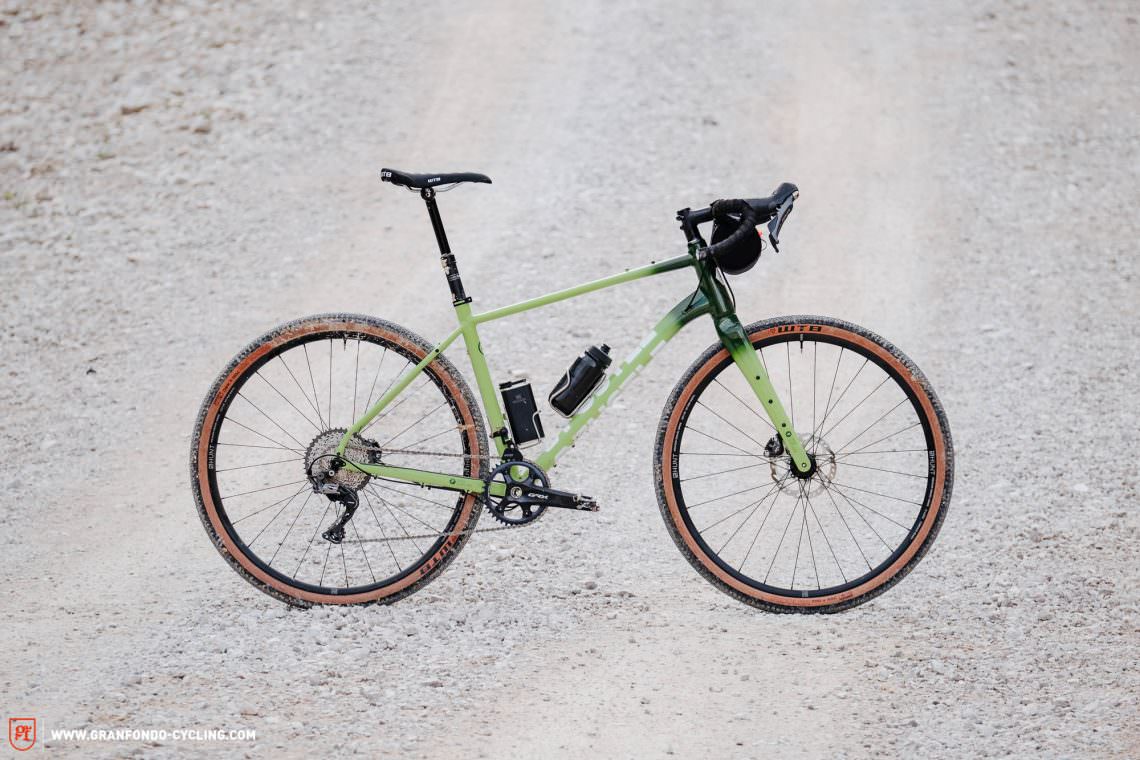
Fustle Bicycles is a new brand based in Northern Ireland and an advocate of uncomplicated bikes that combine high performance design with an affordable price. They send their first bike, the Fustle Causeway, for this group test with a revised spec and a fresh look. What defines the Causeway TRAIL Lite?
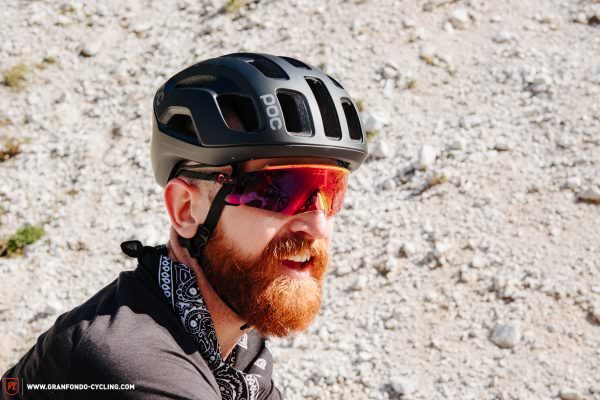
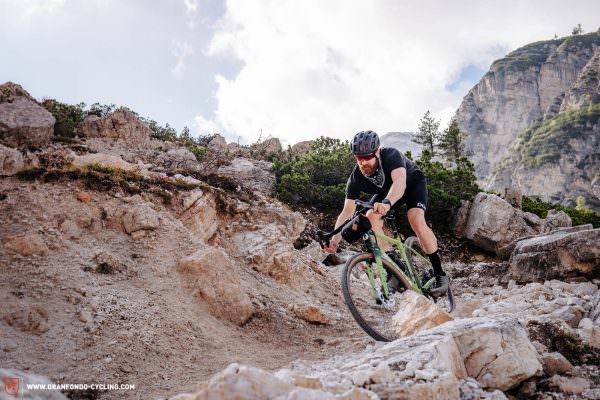
Fustle Causeway TRAIL Lite in detail
With the € 3,500 Causeway, Fustle send the only bike with an aluminium frame for the concept comparison. The progressive geometry for a gravel bike, with a reach of 425 mm, a head angle of 69° and a wheelbase of 1,103 mm, stands out from the crowd and reflects the mountain bike DNA of the platform. With an extensive online customisation tool, customers can choose the handlebar width, stem length, seat post offset, saddle and tire width without paying anything extra. If you want to customise the bike further, there are a variety of upgrade options available, from 1x and 2x drivetrains to dropper posts, carbon wheels and cockpit components.
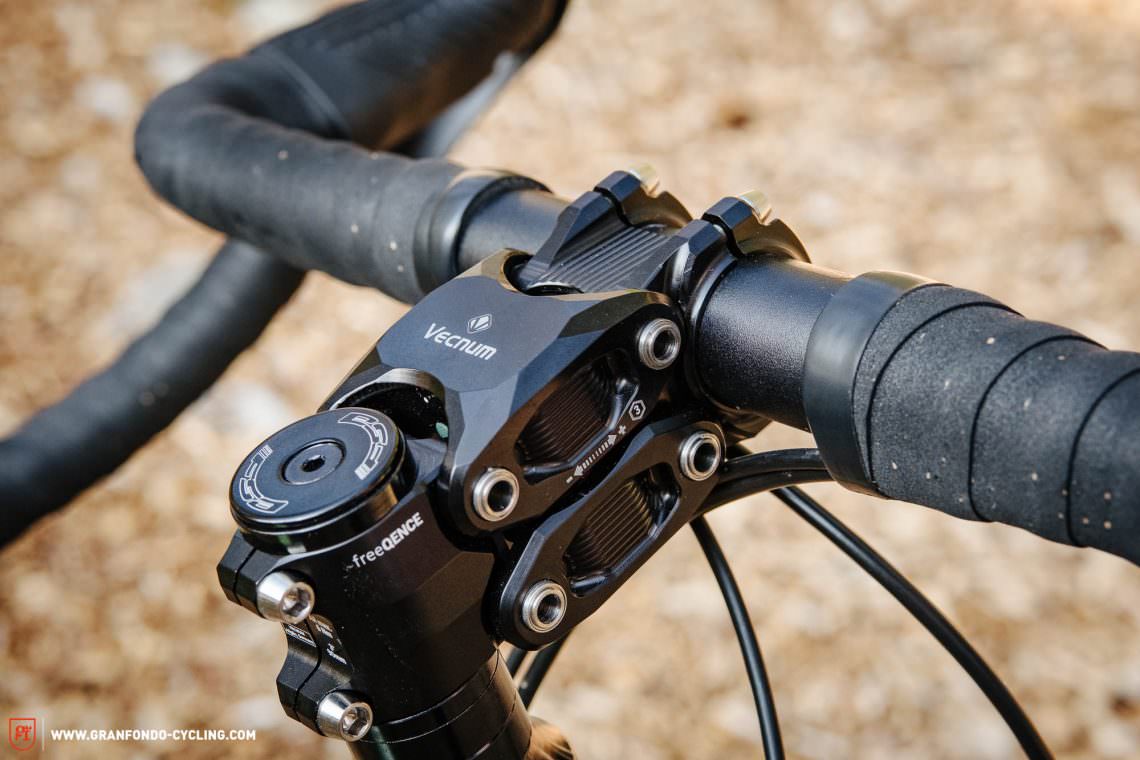
Not available from Fustle, but a very useful upgrade: the Vecnum freeQUENCE stem with 30 mm travel. After a few test laps with it on the Fustle, we can recommend it for improved long distance comfort.
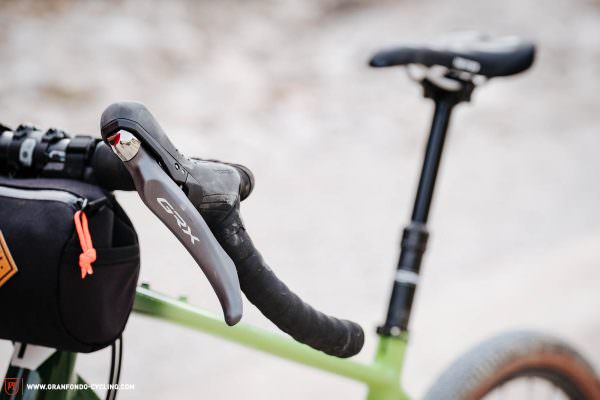
Thanks to the 1x drivetrain, the left Shimano lever isn’t needed for shifting and is instead used for the 120 mm travel PRO Koryak dropper post. It moves the saddle properly out of the way, so you’re free to let loose on the trail!
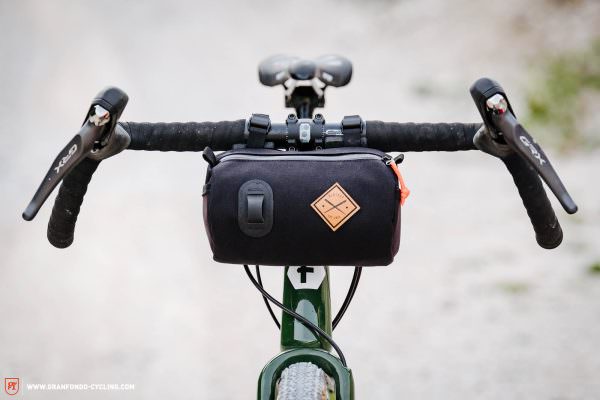
The PRO Discover handlebar has a pronounced flare. With its compact drops, it suits the bike’s field of use and offers a lot of control thanks to its width.
Fustle Causeway TRAIL Lite
€ 3,500
Specifications
Fork Fustle Carbon Fork w/ Triple Mounts 0 mm
Seatpost PRO Koryak 120
Brakes Shimano GRX BR-RX810 160/160 mm
Drivetrain Shimano GRX RX800 1x11
Stem PRO Discover 90 mm
Handlebar PRO Discover 440 mm
Wheelset HUNT 4 Season Gravel Disc X-Wide
Tires WTB Riddler 700 x 45C
Technical Data
Size XS/S S/M M/L L/XL
Weight 10.04 kg
Specific Features
progressive gravel geometry with 69° head angle and 73° seat tube angle
compatible with dropper post, mudguards and suspension fork
lots of mounting points on the frameset for bottles and luggage
configuration options via the online tool
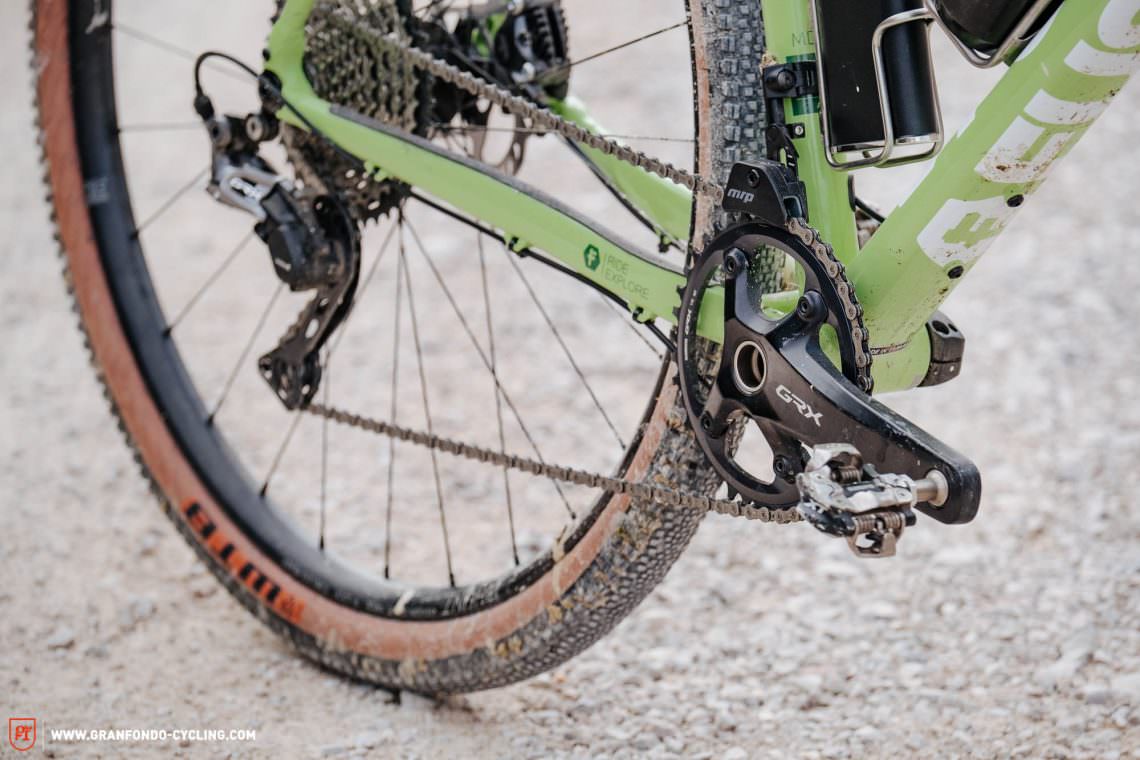
The 40 t chainring in combination with the 11–42 t Shimano DEORE XT CS-M8000 cassette requires a lot of force on the pedals on steep climbs. For the bike’s leisurely attitude and climbing characteristics, we recommend a smaller chainring and/or a larger cassette.
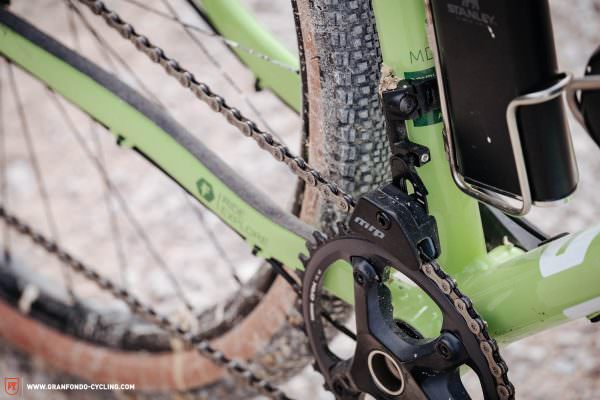
The MRP chain guide is a useful feature and always keeps the chain where it belongs. However, from a purely aesthetic point of view, it’s open to some criticism.
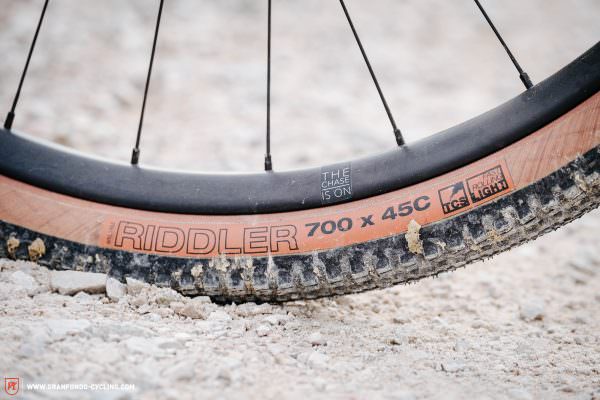
We couldn’t get the combination of WTB Raddler tires and HUNT 4 Season Gravel Disc X-Wide aluminium wheels to seal properly during our test. Other than that, the tire suits the bike well!
Like the Canyon Grizl, the frameset offers tire clearance for tires up to 700 x 50C. The WTB Riddler tires fitted on the HUNT 4 Season Gravel Disc X-Wide aluminium wheels are 46 mm wide and thus fit easily. However, we couldn’t get this wheel and tire combination to seal properly despite a generous helping of sealant and extra layers of rim tape, having to pump the tires up again and again. Apart from that, the tires were convincing in terms of their riding performance. Like the Canyon, the Shimano GRX RX800 groupset with a 40T chainring and an 11–42 t cassette doesn’t provide the necessary range for the uphills. Spoiler: on a bike as trail-biased as the Fustle, this isn’t commensurate with its range of use and is doubly annoying, as getting to the top of the trail can be a real struggle. Once on the trail, you can enjoy the 120 mm travel PRO Koryak dropper. It is smartly operated by the left Shimano lever, which isn’t required for shifting the 1x drivetrain. In size M/L, our test bike weighs 10.04 kg.
No nonsense spec: Fustle rely on aluminium components for their robustness on this build.
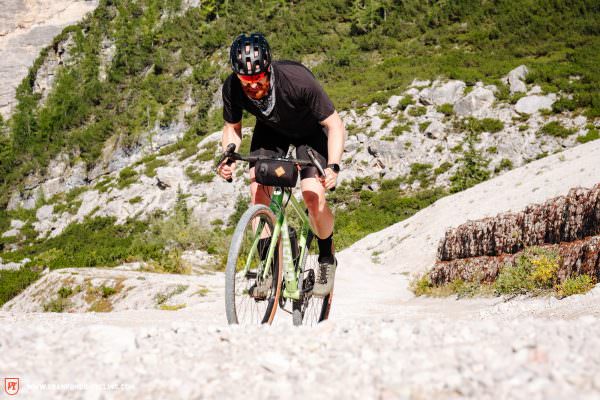
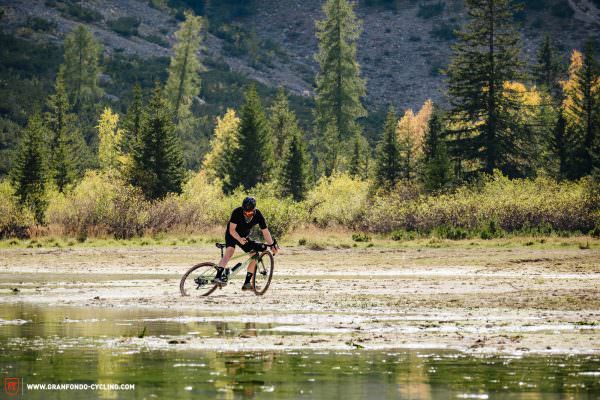
| Size | XS/S | S/M | M/L | L/XL |
|---|---|---|---|---|
| Seat tube | 440 mm | 460 mm | 480 mm | 500 mm |
| Top tube | 556 mm | 583 mm | 608 mm | 634 mm |
| Head tube | 180 mm | 185 mm | 185 mm | 190 mm |
| Head angle | 69.0° | 69.0° | 69.0° | 69.0° |
| Seat angle | 73.0° | 73.0° | 73.0° | 73.0° |
| Chainstays | 430 mm | 430 mm | 430 mm | 430 mm |
| BB Drop | 70 mm | 70 mm | 70 mm | 70 mm |
| Wheelbase | 1,052 mm | 1,078 mm | 1,103 mm | 1,130 mm |
| Reach | 375 mm | 400 mm | 425 mm | 450 mm |
| Stack | 593 mm | 598 mm | 598 mm | 603 mm |
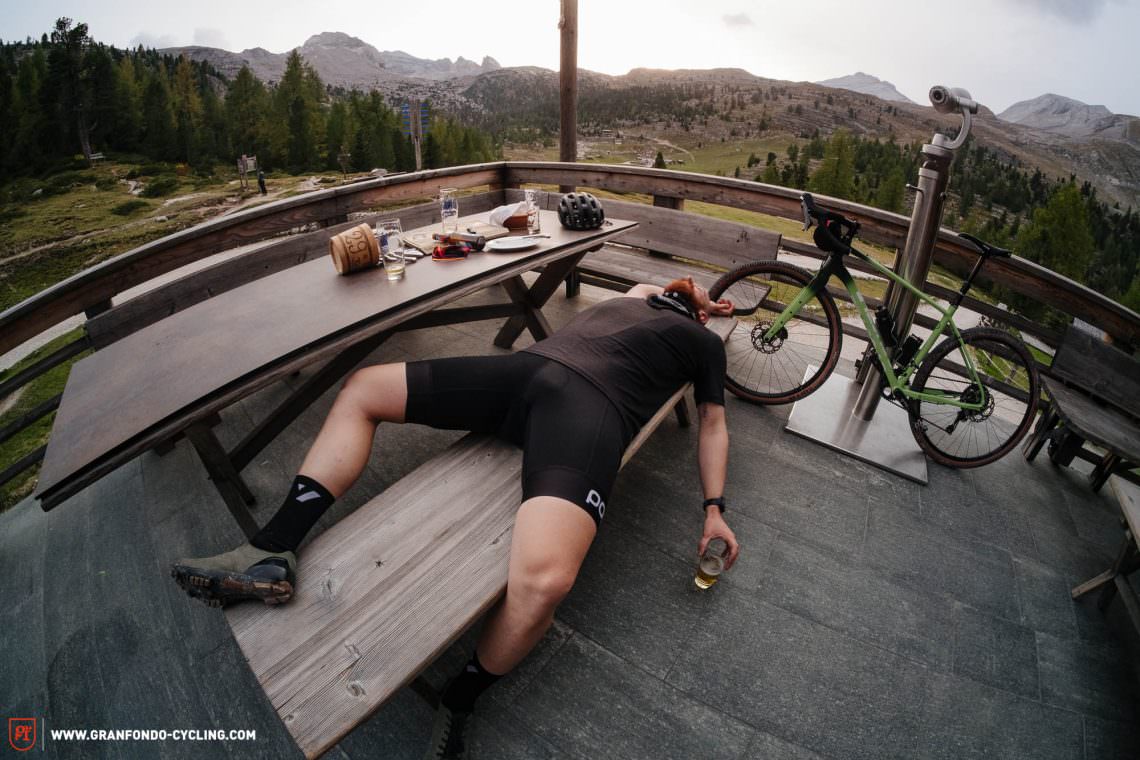
Jersey POC Men’s Light Merino Tee | Shorts POC Road Thermal Bib Shorts
Shoes Specialized S-Works Recon Lace | Socks VOID Socks 16
The Fustle gravel bike on test: our impressions
The Causeway’s handling quickly makes clear what it wants: speed, and preferably on demanding terrain! At medium speeds, its almost stoic smoothness requires an active riding style and intentional steering input. This is where the bike’s length becomes its undoing, especially in twisty terrain. However, you can also enjoy a relaxed cruise along the road or forest path. The bike is similarly comfortable when accelerating and proves to be comparatively light-footed. While climbing, the long front end and slack head angle tend to cause the front to flop around quite significantly compared to the test field, and it prefers to climb slowly and in a relaxed fashion. Whether on gravel, trail or asphalt, the Causeway unfolds its full potential at high speed, where the bike finds a sweet spot between agility and smoothness. In terms of comfort, the bike sits at the bottom of the test field. However, the large volume tires with their inherent “suspension travel” and good damping ensure that the Fustle still offers a reasonable level of comfort even on rough gravel. The carbon fork also has a pleasant level of compliance and can make good use of this thanks to the slack head angle. On roots and with larger impacts, the Fustle is emphatically honest, direct and tight.
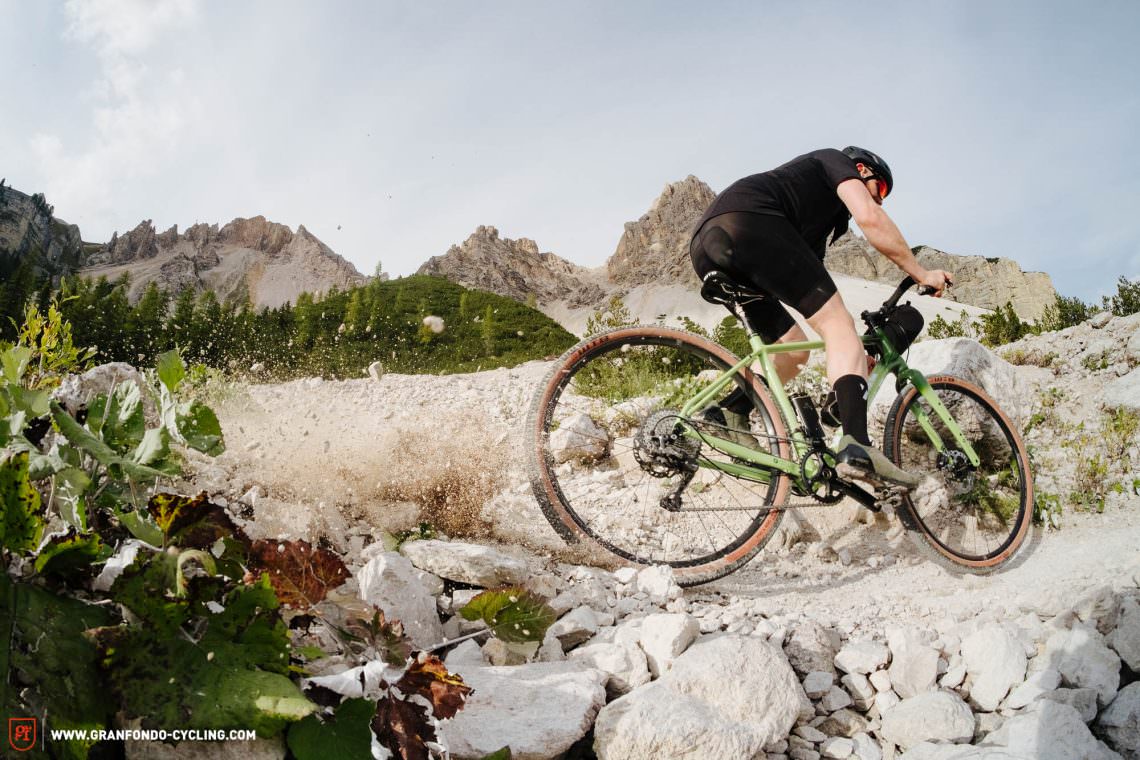
The good thing: due to the dropper post, you have maximum freedom to move around while riding. If you have the necessary fitness, you can also experience an occasional bikepacking adventure without having to worry about any complicated suspension components. Thanks to the numerous attachment points, there is also plenty of room to fit luggage on the frameset.
On steep downhills and the trail, the hour of the Causeway TRAIL Lite strikes loud, because you can lean the bike underneath you through corners and actually get the shoulder knobs of the tires to bite. No matter whether it’s an open high speed hardpack corner or steep scree slope, experienced bikers will get their money’s worth here, unable to get the grin off their face and forgetting how hard they had to work to get to the top. Thanks to the long head tube, the front isn’t overly low and you feel safe and integrated with the bike. The handlebar flare is very pronounced. However, with its compact drops, it suits the bike’s field of use and offers a lot of control with its width. When eating up particularly large amounts of descent, you might find yourself pushing the brakes to the limit. Despite their very good fade resistance, larger 180 mm brake discs would offer even more reserves. However, this mounting option does not exist on the Fustle. Instead, to the surprise of some of our testers, 140 mm rotors can be mounted on request.
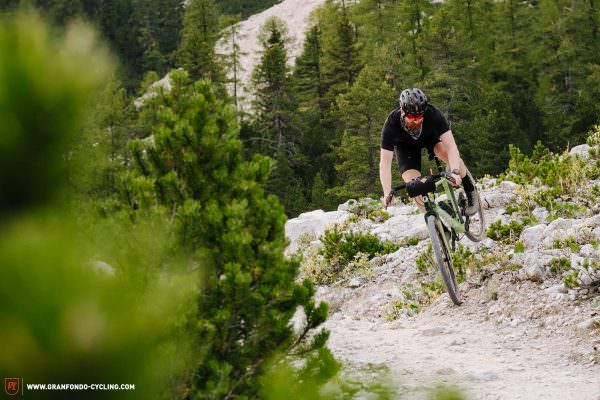
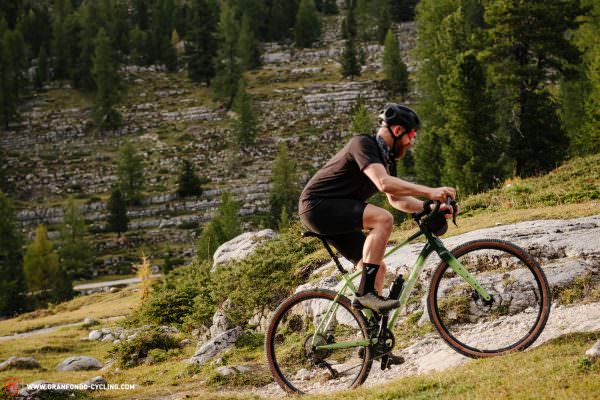
Tuning tip: smaller chainring or bigger cassette to get to the top of the trail more easily
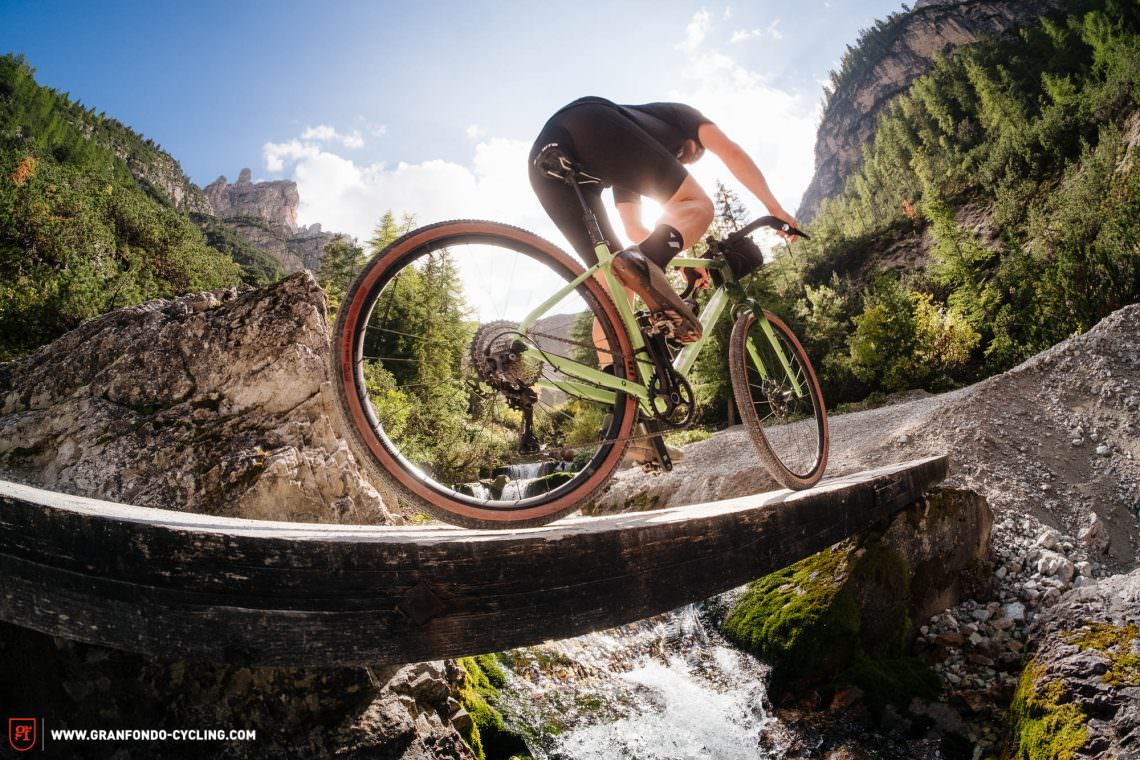
The perfect application for the Causeway TRAIL Lite
It does what it says on the tin and so it’s probably of little surprise that the greatest strength of the Fustle is trail use. However, in comparison to the rest of the field, one thing was very surprising. For accomplished riders, the Causeway was the fastest bike on the trail. The progressive geometry and maximum freedom of movement make this possible. Beginners can also benefit from this on easy downhill passages but will have to get used to the bike’s handling at low speeds. However, apart from its trail prowess, the Fustle’s versatility drops significantly compared to the competition. Away from the trail, it’s well-suited to leisurely bikepacking adventures without any time pressure and suspension worries. In all other scenarios, you’re better off with the other bikes tested. In addition, the concept of a trail and gravel bike only works to a limited extent, as the gear ratio of the drivetrain makes it difficult to get to the top of the trail.
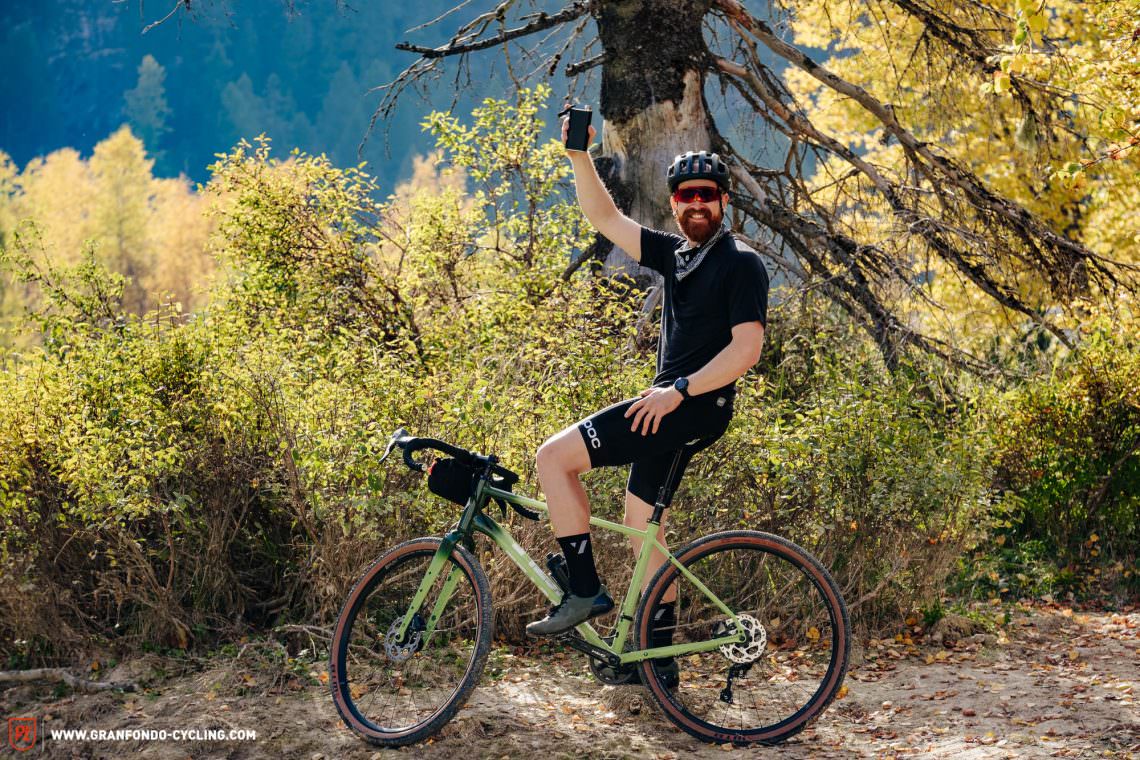
Technical Data
Fustle
Causeway TRAIL Lite
Size: XS/S S/M M/L L/XL
Weight: 10.04 kg
Price: € 3,500
Fustle Causeway TRAIL Lite conclusion
The Fustle is a trail specialist and becomes a true trail rocket beneath experienced riders – at least downhill. Thanks to the dropper post, the geometry and the cockpit, you can make maximum use of your freedom of movement to absorb shocks. However, beginners and connoisseurs alike will find more versatile bike concepts with more comfort and a significantly wider range of applications in our test field.
Tops
- stable ride at high speed
- ample tire clearance
- trail performance
- lots of freedom of movement
- mounting points and frame features
Flops
- gear range too limited
- limited long distance comfort
- brake fade resistance at the limit
- relatively narrow range of applications
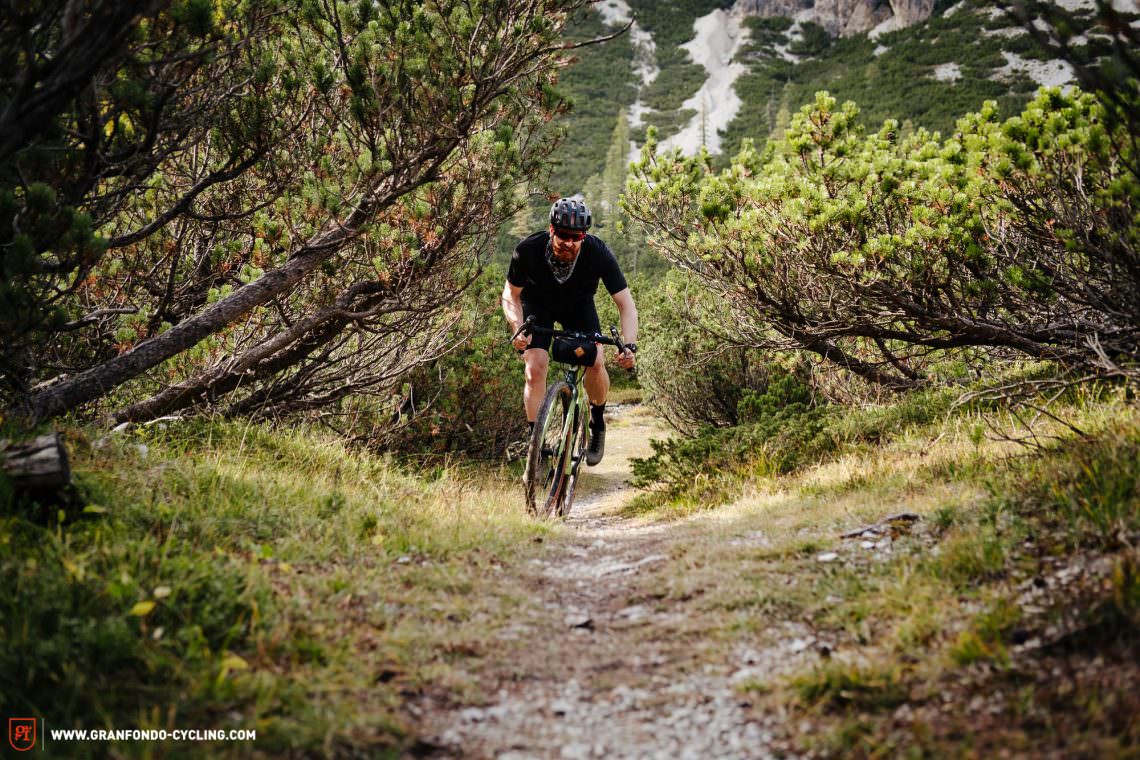
You can find out more about at ridefustle.com
The test field
Get an overview of the grouptest here: Gravel vs. mountain bike – 6 models on test
All bikes in test: BMC Twostroke 01 ONE (Click for review) | BMC URS LT ONE (Click for review) | Canyon Grizl CF SL 8 1by (Click for review) | Fustle Causeway TRAIL Lite | Lauf True Grit SRAM XPLR Edition (Click for review) | Trek Supercaliber 9.8 GX (Click for review)
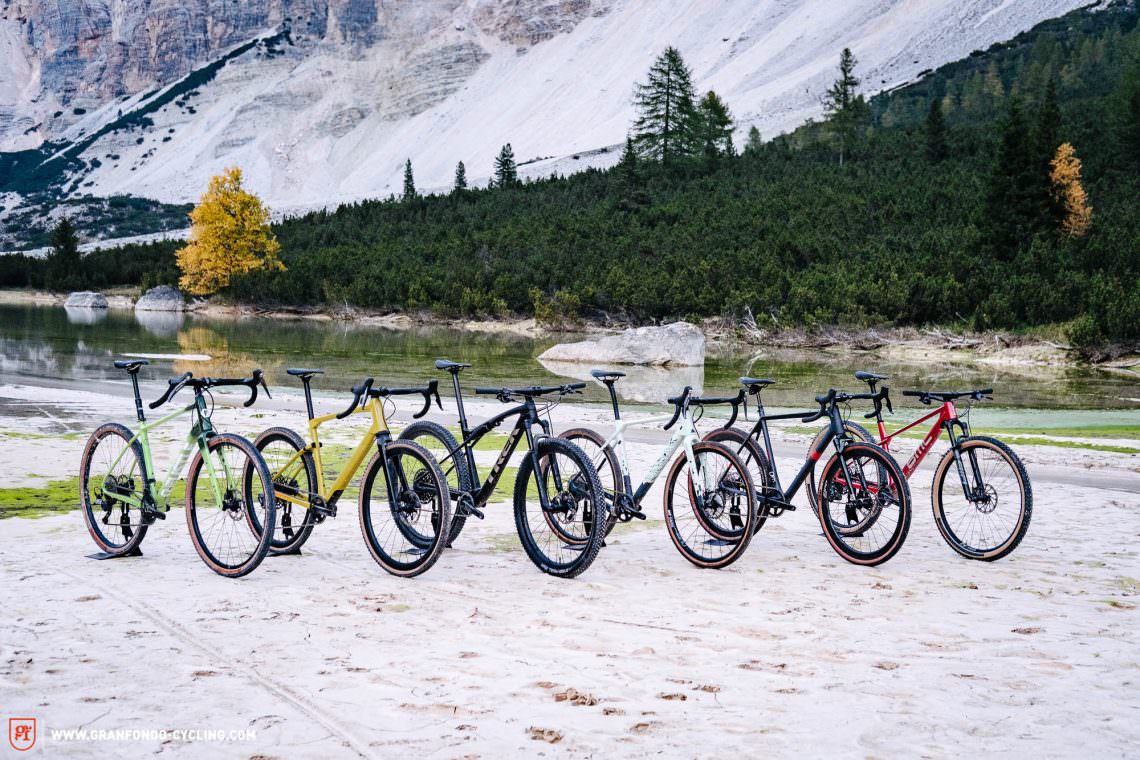
No, it’s not about perfect race tracks, it’s about efficiency. Fast, fleet-footed and efficient – those who want to speed along high-speed passages need a defined and spritely bike that accelerates with ease and efficiency. Nevertheless, reliable components are important too. We interpret “Smooth tarmac” bikes as follows: Hard efforts at high speeds with a maximum efficient bike on a consistently well-paved road. Effort-joy ratio: 80:30 (not everything has to be 100%!)↩
… also known as bike riding. Broken-up roads in the hinterland, deadlocked gravel roads, loose surfaces – sometimes muddy, sometimes bone-dry. For this, it takes bikes with super all-round, handling and wearing qualities uphill and downhill. Effort-joy ratio: 50:50↩
Did you enjoy this article? If so, we would be stoked if you decide to support us with a monthly contribution. By becoming a supporter of GRAN FONDO, you will help secure a sustainable future for high-quality cycling journalism. Click here to learn more.
Words: Photos: Peter Walker


